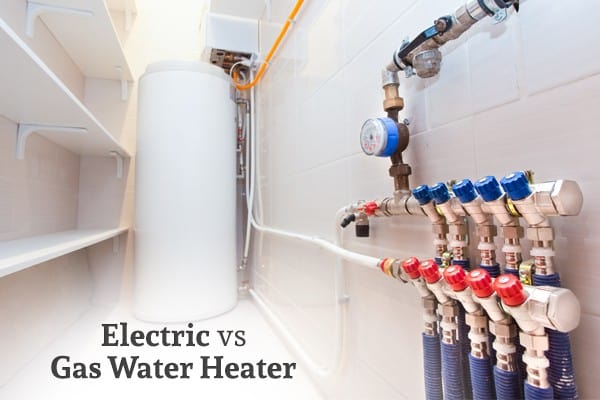
If your existing water heater is due for replacement or you’re in the process of building a home and need to choose a brand-new water heater, you’ll have two main options to choose from: an electric water heater or a gas water heater.
With an existing home, it’s generally best to stick with whichever type of water heater your home already has, though this is not always the case. With new construction, however, there are some important factors to consider that may help you decide whether an electric- or gas-powered water heater is right for you.
What Type of Power Does Your Home Use?
Start by considering what type of power your home will use. Nearly all homes, for example, have access to electricity. However, some homes have access to both gas and electricity. If your home has (or will have) access to only electricity, then an electric water heater is likely your best bet. Otherwise, the cost involved with adding natural gas lines or propane can drive your expenses up considerably.
If your home has access to gas and electric power, then there are some other factors you’ll want to consider when deciding on a water heater.
Initial Costs
The initial cost of installing and setting up a water heater will depend on many factors. The first factor is the size of the water heater and its tank, as a larger heater and tank will require more labor to maneuver and install. Larger tanks also tend to be slightly more expensive, but it’s important to select the tank size that is right for your household size so you don’t run out of hot water when you need it.
The efficiency of the water heater is another factor to consider; heaters with higher energy efficiency ratings will tend to cost more up-front, but they may save you money in lower energy bills in the long run.
In general, gas water heaters tend to have higher up-front costs than electric water heaters. However, because gas water heaters usually cost less to operate, they may save you money over time when compared to an electric heater.
Energy Factor (EF) Ratings
You’ll also want to consider energy factor (EF) ratings when deciding between a gas or electric water heater. Specifically, EF ratings measure how much hot water can be produced in a day compared to the amount of fuel the heater is using. The higher the EF rating, the more efficient the water heater.
In general, electric water heaters usually have higher EF ratings than gas heaters. However, you should always look for the exact rating as you shop. You can typically find this rating inside the manual that comes with the heater or somewhere on the yellow “Energy Guide” label that is located along the side of the tank.
As you look at EF ratings, be sure to look at other important information as well, such as:
- estimated yearly operating costs
- estimated amount of energy used annually
- tank size in gallons
- first-hour rating
How Long It Takes to Heat Up
Because of the immediate combustion of the gas, the water in a gas water heater tends to heat up more quickly than the water in an electric gas heater. This will be reflected in a rating known as the “first-hour rating” (FHR), which you can find on any water heater’s yellow “Energy Guide” label. If quick access to hot water when you need it is important to you, then you’ll want to select a water heater with the highest FHR you can find.
Specifically, an FHR shows how much hot water can be delivered in the first hour that the water heater is fully heated. The higher the number, the better.
Life Expectancy
For both electric and gas water heaters, a tanked water heater will generally last for 10-13 years before it needs to be replaced. Meanwhile, tankless water heaters will usually last closer to 20 years before replacement is needed. Tankless water heaters are available in both gas and electric formats, so this is something to consider as you shop around as well.
Need a New Water Heater? Our Team Can Help!
As you can see, there are many things to consider as you decide whether to purchase a gas or electric water heater for your home. Both types of water heaters come with some inherent advantages and potential drawbacks. Ultimately, you’ll need to think carefully about your own priorities and lifestyle to determine which is best for your needs and budget.
Regardless of whether you opt for an electric or gas water heater, our team at HEB Plumbing & Sprinkler is here to help! We offer installation, service, and repairs on both gas and electric water heaters across Bedford, Hurst, Euless, and more. Contact us today to schedule your service!
